
In 2011, during an interview for my book “1982″ (Editorial Sudamericana), Rear Admiral Edgardo Aroldo Otero, former Chief of Operations of the General Staff of the Navy, gave me a lengthy account of how the events unfolded would culminate in the war for the Falklands with the United Kingdom of Great Britain. In parentheses, I have summarized some “forgetfulness” of the late Rear Admiral Otero, with whom I had several meetings.
Since 1955, the Navy had a project for the recovery of the Falkland Islands that was being updated from time to time. It was an obsession that gained new momentum when Argentina set up a scientific observatory on the Morrell Island of the South Thule group (1976) and the British did not react. Eventually, in May 1981 it occurred to Vice Admiral Juan José Lombardo to repeat the Thule experience on San Pedro Island in South Georgia. In other words, a similar observatory that marked another Argentine presence and that, with an eye to the Falklands, would help to revalidate titles based on the historical claim. The 1981 project is sent to the General Staff and is taken over by Vice Admiral Rodolfo Suárez del Cerro, chief of Naval Operations during Lambruschini's administration. The matter was a secret and it was in his safe. At that time, the operation was called “Alpha”, an operation in which only civilians would participate, “accompanied” by a small group of military scientists. Later, the group “Alfa B” composed of marines would join. Four months after the May 1981 document was written, Jorge Isaac Anaya replaced Armando Lambruschini; Alberto Gabriel Vigo promoted to Chief of Staff and Lombardo was commander of Naval Operations. At the end of January 1982, the operation on San Pedro Island was a little better known. It had been taken out of the safe, in anticipation of the failure of the diplomatic negotiations with the English that were to take place in February in New York City. At the same time, the British had prepared “Operation Trident”, which in a few days mobilized the sea fleet, as if to send it to the Falklands.
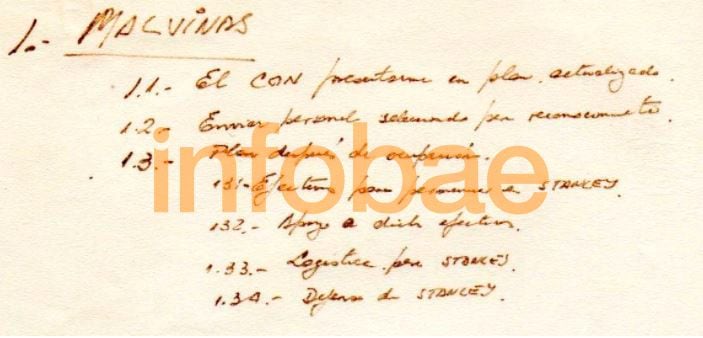
Admiral Jorge Anaya took office in September 1981 because Admiral Armando Lambruschini returns to the conception of the old navy: every 2 or 3 years the Command in Chief of the Navy had to be renewed. We must not forget that Massera was there between 1973 and 1978. Under the command of Anaya, Admiral Lombardo — the one who had proposed an operation in San Pedro — is the commander of Naval Operations (COP). Towards the end of 1981 - December 22 - around Christmas, Anaya gathered the admirals of the General Staff and Lombardo instructed that an operation “must” be prepared in a “preventive” manner to a failure to diplomatic negotiations at the United Nations. Plans must be made without a date of execution. He tells this to a small group of admirals (Vigo, Otero and Lombardo among others). Otero does not say that on December 22 (the same day that General Leopoldo Galtieri took office as de facto president) he issues a handwritten instruction to Vigo to study a plan for the “occupation” of Puerto Stanley (later Puerto Argentino).
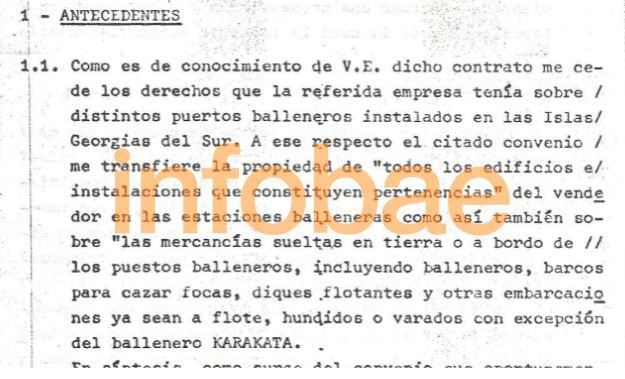
In the midst of all this, another matter was mixed: in 1979 the businessman Constantino Davidoff entered into a contract to purchase 30 tons of scrap metal for 115,000 pounds (at that time he earned seven million pounds) in three stations, or logistics bases for whaling ships. In order to formalize this contract, it had to pass the filter of the English authorities, who at first showed some reluctance. With the signed contract he asked the English ship “Endurance” to transport the goods, but the English government refused it. Davidoff estimated that his tasks ended in 1984. At the Argentine Foreign Ministry they were interested in the project and talked to the Navy.
In the final days of Jorge Rafael Videla's presidency, on February 3, 1981, as Chancellor Carlos Washington Pastor, Ambassador Ángel María Olivieri López, Director General of Antarctica and Malvinas, signed Memorandum No. 53 stating that “today this Directorate General was informed, through a telephone call from Mr. (Juan Carlos) Olima, a former official of this Foreign Ministry and current manager of Banco Juncal, that Mr. Constantino Davidoff requested the extension of a loan from that financial institution, intended for the acquisition of all the material abandoned by the former Argentine Fishing Company in the islands South Georgia”. In addition, he reported that Davidoff is one of the managers of “a company incorporated entirely with Argentine capital, dedicated to the purchase of scrap metal, which in this case would include abandoned warehouses and dry dock, as well as a series of ships sunk in the vicinity of such facilities”.
In point 3, Olivieri López reported that “the selling entity would be the Christian Salvesen Ltd of England and a copy of the respective contract” was “sent to the Governor of Malvinas, Mr. Hunt”. Finally, he said that Olima “reported having sought the opinion of the British embassy, which expressed, through Secretary Gozney, that since he understands that it is a private commercial operation, it is not a matter of his competence.”
Davidoff wanted to go to Georgias, for a low price, to recognize the material. The Navy follows it closely: the Naval Operations Command depended on the Antarctic Naval Operation Command and transport. Taking advantage of the voyage of the ship “Almirante Irízar” with six civilians, he inspects, and returns (December 1981).
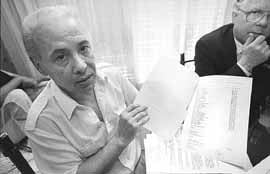
On March 11, 1982 (when the Military Junta, on Monday, January 5, 1982, had begun to discuss the military option for the Malvinas) “43 people, the material for logistical support and the material means to work — in total 80 tons — were shipped on the ARA 'Bahia Buen Suceso', a ship belonging to the 'South Coast' line of Naval Transport to, as the first place, to the island of San Pedro, in South Georgia”. This is stated in the cable “Secret” 616, dated 24 March 1982, sent to London and the United Nations Mission (where the list of personnel on board is given). Otero does not say that around March 8, Foreign Minister Nicanor Costa Méndez tells former Foreign Minister Bonifacio del Carril that “in a month we will take the Falklands”).
In those days, Ambassador Carlos Lucas Blanco (director of the Antarctica and Malvinas Department of the Foreign Ministry) invited Rear Admirals Eduardo Morris “the Englishman” Girling (Naval Intelligence Service) and Edgardo Otero to his house for lunch. The days of negotiations at the United Nations with the English were near. The owner of the house brought up the subject but was not told anything. I didn't think there could be an “operation”, I was just looking for information on Davidoff. The operation “Alpha B”, that is, docking naval troops to the scrap metal dealers, was carefully considered by the Navy.
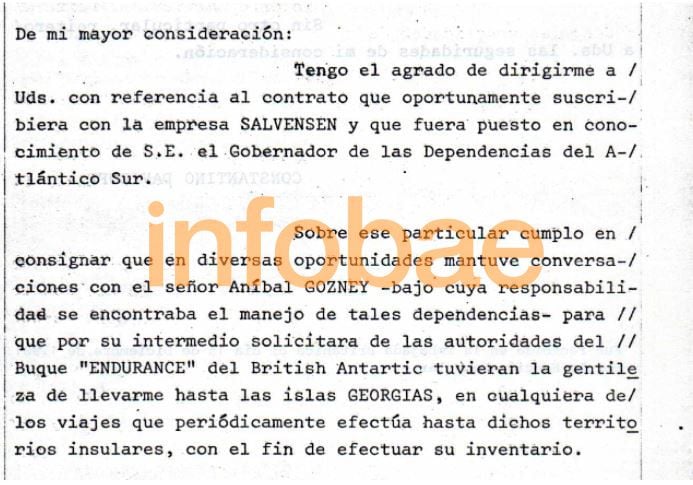
The information highlighted by Rear Admiral Otero in the previous paragraph does not coincide with what Blanco stated in his “Secret” Memorandum No. 11: “Evolution of the Malvinas question” of January 8, 1982. In this document, Ambassador Carlos Lucas Blanco speaks quite naturally of “Operation Davifoff and the Alpha Group”. And point 180 of the “Rattenbach report” adds more light: “(...) the Naval Operations Commander (Juan José Lombardo) ordered the commander of the Antarctic Naval Group, Captain Trombeta, to contact Ambassador Blanco and Mr. Davidoff, in order to coordinate the details of the operation.” The “Alpha” group, with a total of 15 men under the command of Lieutenant Alfred Astiz, was to arrive in Port Leith after the last British Antarctic Campaign ship had withdrawn from the region. In the next point it will be clarified that “the group 'Alfa' was made up of properly trained military personnel. The instructions that would be given in due course were to resist until the last consequences should British forces intend to evacuate him from the island (statement by Rear Admiral Edgardo Aroldo Otero, Chief of Operations of the General Staff of the Navy before the Rattenbach Commission).
As of Tuesday, January 12, 1982, at the disposal of the Military Junta, Corps V (General Osvaldo García) and the Air Force (Brigadier Plessel) were incorporated and they began planning the “Operation Malvinas” with Lombardo. The Malvinas Theatre of Operations (TOM) will be chaired by General García and the final details were directly involved, among others: General Américo Daher (commander of the Ground Force), Gualter Allara (commander of the Amphibious Task Force) and Carlos Busser (commander of the Landing Force).
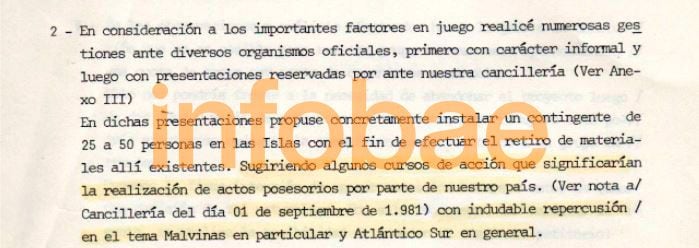
In the midst of planning, a question is asked: What if there is an English reaction against Argentine civilians? Then appears the group “Alpha B”, composed of military personnel, which would operate in a “preventive measure”. The group embarks in Ushuaia for the Georgias Islands in the “Buen Suceso Bay”. When everything breaks down, Lombardo asks that they stop Operation Alpha B, but they were already there. Then order them to stay preemptively in the area. On Otero's understanding, the shipment of the ship “Endurance” manifested Britain's first war gesture. Ambassador Anthony Williams said that 22 “marines” were going to get them out. The “Bahia Buen Suceso” was in the Orkney Islands with the 14 sailors: 2 officers, doctor and tactical personnel and commandos. When they are to be forcibly removed, the “Bahia Buen Suceso” is ordered to arrive earlier in Puerto San Pedro, before the “Endurance” is understood. The first force that Argentina highlights is on San Pedro Island.
Around these days, the commander-in-chief of the English Navy leaves for Gibraltar to witness an exercise and tells Woodward to preemptively prepare a fleet. On March 29, Thatcher authorizes 3 nuclear submarines to travel south (“Trident”, “Spartan” and “Conqueror”). London is 13,000 kilometres from the Malvinas. Ascension Island at 6,000 kilometers. Without the United States base on Ascension, the English recovery of the Malvinas would have been very costly. England had a “contingency plan” (not only for the Malvinas, but also for the needs of NATO or the European Economic Community). This is the only way to understand how a British Task Force was formed in such a short period of time. That plan was important, because “preventing” cost less than “recovering”.
In Argentina there was only talk of “invasion” for May/June 1982. And the Air Force in September. The Navy was to have 6 Super Etendards and 3 more Orion planes before May '82. Over the years and the knowledge of many secret documents and intimacies, it was possible to elucidate, in a timely manner, the long chain of decisions that led to the clashes in the South Atlantic. “Alpha” and “Alfa B” groups; planning in the Argentine Navy; resolutions within the Military Junta; confidences of the protagonists and instructions given very quietly, in the face of the breakdown of the Argentine internal political and social front.
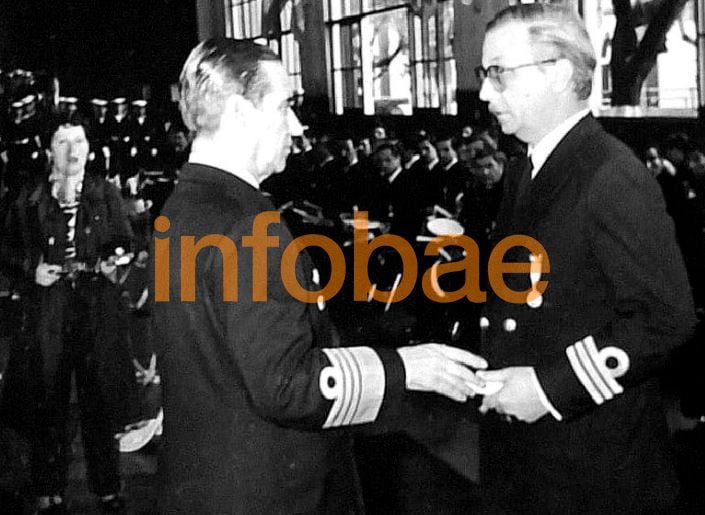
Despite this, Admiral Jorge I. Anaya explained that “on March 19, the workers of the South Georgia SA Company of Mr. Davidoff landed in the port of Leith, South Georgia Islands, and Great Britain, on 20 and 21, began an escalation of the incident which was inexplicable in Argentina because it was not the first time they had traveled to the islands; there was no military contingent among the workers (as even the Franks report reaffirmed in 1983); the Anglo-Argentine contract was being fulfilled in order; and on 9 March the British Embassy in Buenos Aires had been informed that on 11 March the ship was leaving for Leith. Likewise, the workers were equipped with the necessary documentation specified in the 1971 agreements. [...] All this reinforces the impression that the Davidoff incident is created and magnified by Great Britain to justify the non-negotiation and reinforcement of the Falkland Islands. This was proved by the shipment, on 20 March, of the ship “Endurance” to force the workers of Davidoff.
This entire incident was analysed by the Military Junta on 23 March, resolving, as an emergency measure, the sending of the “Paradise Bay” to South Georgia for which it would divert from its mission in the Antarctic campaign. The “Paradise Bay” would comply with preventing the forced evacuation of Argentine workers by the “Endurance” that was there from March 21-22 with a contingent of sailors on board, in addition to their conventional armaments. This meeting, as well as at the meetings on 24 and 26 March, continued to analyze the situation raised by the Davidoff incident in the light of the centuries-old dispute with Great Britain over the sovereignty of the Malvinas Islands, South Georgia and the South Sandwich Islands. (Anaya explained this in document “S” No. 3.1.057.10, page 6).
In his book of Memories, Costa Méndez says that in the face of the incident in the South Georgia Islands, on Saturday 20, “no one in the Foreign Ministry expected this episode.” In the following years, the opinion would plummet in the face of evidence provided by the testimonies of the protagonists and circumstantial witnesses.
“The Georgias operation was prepared well in advance. I know this because the ship that carried the junkmen also carried people from the Antarctic Command, for the second stop of the trip. The captain of the ship, when he set sail, received two sealed envelopes: One with the order to cut off the radio contact (on a certain day); another instructing to direct the ship first to the Georgias Islands. The whole operation was carried out on the basis that the English would not respond. There was a great improvisation, in all orders.” , Colonel Luis Carlos Sullivan, director of the Antarctic Command, entrusted to the author on 16 August 1982.
On Tuesday, March 23, 1982, the issue that was developing in South Georgia jumped to morning tapas. “A British protest was rejected,” he titled “The Nation,” which also spoke of “excesses in the Falklands” and that “the foreign office dismissed the claim of the Foreign Office that considered that Britain's sovereignty in the South Georgia islands was violated.” “Symbolic occupation of South Georgia” titled Clarín to four columns, in addition to recounting that “a group of Argentines raised the Argentine flag and sang the National Anthem, after which they retired. British protest. Falklands attacked the offices of LADE (State Airlines) in the archipelago.”
“Around March 22 or 23, when a response note was being prepared to the British government, Enrique Ros said 'tighten the conditions to see if the English accept and ruin the operation' (invasion). They intended Britain to publicly acknowledge that Argentine workers in South Georgia were without problems, without the comptroller required by the British, and two or three more points that were unacceptable. The meeting was attended by Federico Erhart del Campo, Guillermo González, Marcelo Huergo, Enrique Candiotti (legal counsel of the San Martín Palace) and two or three other diplomats. One of the attendees reported in “off” (to the author) that when Ambassador Williams saw the answer, he said:
- Ambassador Anthony Williams: 'Mr. Ambassador, is this war? '
- Ambassador Enrique Juan Ros: 'It's war'.”
The extensive report of the Military Junta will say that the phrase Williams uttered to Ros was: “The time to seek a solution is running out.”
KEEP READING:
Últimas Noticias
Debanhi Escobar: they secured the motel where she was found lifeless in a cistern
Members of the Specialized Prosecutor's Office in Nuevo León secured the Nueva Castilla Motel as part of the investigations into the case

The oldest person in the world died at the age of 119
Kane Tanaka lived in Japan. She was born six months earlier than George Orwell, the same year that the Wright brothers first flew, and Marie Curie became the first woman to win a Nobel Prize

Macabre find in CDMX: they left a body bagged and tied in a taxi
The body was left in the back seats of the car. It was covered with black bags and tied with industrial tape
The eagles of America will face Manchester City in a duel of legends. Here are the details
The top Mexican football champion will play a match with Pep Guardiola's squad in the Lone Star Cup

Why is it good to bring dogs out to know the world when they are puppies
A so-called protection against the spread of diseases threatens the integral development of dogs



